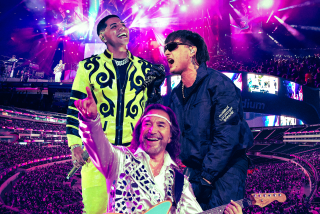Commentary : Rock ‘n’ Roll ‘n’ Violence : Are raucous troublemakers making it hard to safeguard individual rights?
- Share via
Remember when the biggest problem with rock concerts was ticket scalpers?
As anyone knows who attended the latest shows by heavy metal heroes Metallica and rap activists Public Enemy, there’s now another, sadly inescapable concern facing rock fans: personal safety.
“Kids going to our shows know they’re not going to see the Osmond family,” said Bill Adler, publicity manager for New York-based Rush Artists Management, which handles Public Enemy, Run-D.M.C. and other top rap acts.
“Kids with street sense--and that’s the vast majority of kids that attend these (rap) shows--know how to comport themselves in a way that will make sure that they don’t get into any trouble at the show.”
But hundreds of fans (street-smart included) came breathlessly close to trouble last week when gang members disrupted a Public Enemy concert at the Santa Monica Civic Auditorium.
And hundreds more caused trouble earlier this month when Metallica headlined the Long Beach Arena. An estimated 1,000 permanent seats will have to be replaced after fans ripped cushions from seats and hurled them around the arena.
Last summer during Metallica’s portion of the “Monsters of Rock” marathon at the Los Angeles Memorial Coliseum, tens of thousands of fans were caught in a stampede toward the stage, with folding chairs being flung haphazardly, that could only be described as anarchic. Only by luck, it seemed, that there were no more than the estimated 15 (relatively minor) injuries.
It cannot be stressed enough that the vast majority of rock concerts--including rap and heavy metal shows--go off without a hitch. Even the largest, most boisterous rock crowds are rarely any more trouble than the average sports crowd.
But incidents do happen often enough to keep the issue alive in the rock world.
Safety has been a red flag in rock ever since teen-agers danced in the aisles at Alan Freed’s rock ‘n’ roll extravaganzas in the ‘50s, but it was usually only parents who were concerned. The thinking: Those crazy kids don’t know how to control themselves.
Today, though, the fear sometimes penetrates inside the concert halls.
As isolated as the problems are, they cast a shadow--however small at this point--on the future of heavy metal or rap acts whose shows have made the headlines. This is doubly ironic in the case of Metallica and Public Enemy.
Both groups have been active crusaders against just the kinds of mindless aggression that disrupted their local shows. And each is at the creative pinnacle of its respective genre, acclaimed by fans and critics alike for the forcefulness of its message: thoughtful examinations of justice in America, aimed largely at white suburbia in the case of Metallica and black inner cities on the part of Public Enemy.
And if it seems alarmist to say that the actions of an irresponsible minority could threaten the concert future of some of rock’s most valuable acts, it’s not too early to begin pointing to that possibility. There’s bound to be some point where promoters and even fans begin to simply say, “It’s not worth the risk.”
One insurance company already made that decision.
Transamerica insurance last week canceled the coverage of G-Street Express, a D.C.-based company that is one of the country’s largest promoters of rap concerts. The cancellation followed a stabbing death at a G-Street-sponsored concert in September featuring rappers Eric B. & Rakim at the Nassau Veterans Memorial Coliseum in Long Island.
Walter Howell, an insurance agent who handles mainly rock concerts for Detroit-based Haas and Wilkerson, warns that the insurance situation could reach crisis level, and that it’s up to the artists to do something about it.
“I think each artist has to take responsibility,” he said. “The artist has the audience in the palm of his hand. If he doesn’t bring them around, that type of show’s going to be history, or he’s gonna be paying out a lot of money for damage.”
But can the artists control what happens in the hall?
What raises fears among fans and industry officials is that they can’t.
In Public Enemy’s case, the fighting ended only after the group stormed off-stage after just half an hour of performing--and the gang members (uninterested in the other bands on the bill) left the auditorium.
The real question is how to keep the disruptive element out of the hall.
Rock promoters have responded to the infrequent outbreaks with dramatic security measures.
Fans entering Run-D.M.C. concerts at the Greek Theatre in 1987 and 1988 were screened with airport style walk-through metal detectors and were scrutinized by a heavy security force that included mounted police.
Hand-held metal detectors were used last week at the Santa Monica Civic, where a ban on the wearing of gang “colors” was also announced (though eyewitnesses reported that some people clearly displaying colors walked right in).
But metal detectors can sometimes be defeated and a “colors” ban raises constitutional issues.
“I don’t know how you can identify potential troublemakers before they enter the show, both as as a constitutional matter and as a practical matter,” said Ben Liss, executive director of the new North American Concert Promoters Assn. and an attorney with D.C.-based concert promoter Cellar Door Productions.
But isn’t the civil liberties issue superseded by the public safety issue?
On this matter, Joan Howarth, assistant director of the Los Angeles chapter of the American Civil Liberties Union, has said: “It’s impermissible for anyone to operate a public accommodation and to attempt to discriminate on the basis of gang affiliation or perceived gang affiliation.”
Rush Management’s Bill Adler thinks an important step in curbing violence is for the artists to take a leading role in the community.
Public Enemy, he noted, is one of the groups spearheading a movement called “Stop the Violence,” which soon will be making a record and video and will participate in in-school programs to steer kids away from violent behavior both at concerts and in everyday life.
Ben Liss agrees that artist and audience awareness is a key to solving the problem.
“But,” he acknowledged, “this doesn’t deal with it if there are a few individuals that have it on their agendas to be disruptive.”
A dozen years after ticket scalping became an issue in Los Angeles, the unauthorized resale of tickets continues. Will the rock world also have to learn to live with the threat of violence?
More to Read
The biggest entertainment stories
Get our big stories about Hollywood, film, television, music, arts, culture and more right in your inbox as soon as they publish.
You may occasionally receive promotional content from the Los Angeles Times.










